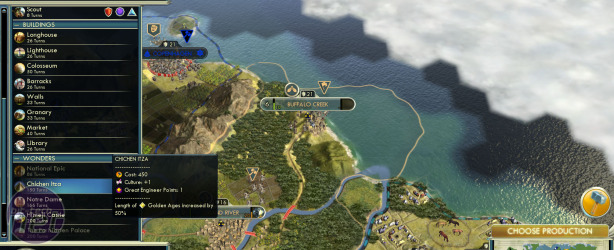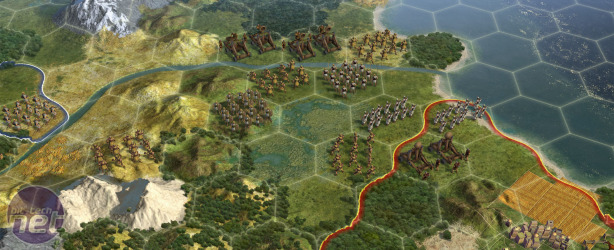Civilisation V Review
That's not the only thing that's changed, of course. There are plenty of little touches dotted around here and there which will cause ardent Civ fans the world over to go “ooh” and “ah” a lot. First up is the new Social Policies system, which replaces the old Civics. These govern the day-to-day running of your faction, providing bonuses to certain styles of play. Liberty allows swiftly expanding players to maximise their Settler output, while Tradition is for those who want to build a massive, sprawling capital full of world wonders, but don't want to spread their influence over the map. Social Policies take the form of eight different strands, unlocked via the accumulation of culture points.It's a much better system than the Civics from Civ IV, requiring long term planning and a definite choice of playing style right from the off. You can't flip between whatever strategy suits you at a particular moment, as once you've activated a policy, you can't go back, whereas you could switch Civics around at will before. It's a more realistic representation of the gradual changes in a society that would occur over thousands of years. Social Policies also herald the removal of the individual religions of Civ IV, which are now lumped together under the Piety strand, providing bonuses to culture and happiness.
Another addition is the new Embark feature, which removes the need to ferry units about over the seas in galleons and transports. Previously, island games were a total nightmare, but with Embark, you can just move units onto a water tile without any other vessels to carry them, they provide a much less frustrating challenge. A tad unrealistic, you might say, but from a gameplay perspective, it's a bloody godsend.
It also means the naval aspect of the game is improved. Before, there was rarely a reason to build sea-faring vessels, and certainly it was almost pointless forging a strong navy, other than to bombard a couple of coastal cities here and there. Now, you'll definitely need them, as the enemy could easily strike your undefended coastlines with little warning. You'll also need naval units to protect your vulnerable embarked troops, who cannot defend themselves otherwise.
Multiplayer has also seen some improvements, with a more stripped down visual approach used in an attempt to reduce lag and problems of that sort. Gone are the full body avatars of the opposing factions from the offline mode, as are unit animations and the frankly awful player-to-player negotiation system of Civ IV's multiplayer. Now you can propose an offer and it's just presented to the other player; a massive improvement over the previous iteration.
Finally, there are the city states, which are probably the most controversial addition. These are micro-factions that consist of one city and which have no interest in expansion. Make friends with them and they'll grant you bonuses to culture, resources or even gift you military units from time to time. Get on the wrong side of them and you’ll either have to conquer their land or fight them as allies of your enemies. In the latter periods of the game, they become invaluable, but early on they seem irrelevant, because you've got so much else to spend your money on and you aren't making enough to justify the expense.
You see, the easiest way (there are others, like carrying out missions or aiding them against an aggressor) to curry favour with a city is to give them gold; 250 for 30 influence, 500 for 60 and so on. This influence degenerates over time, so you have to keep topping it up, which as you can imagine can get quite expensive and frustrating. Investing in the Patronage social policy strand helps a lot, but you'll only get to that after a significant period of time, so city states are often a bothersome distraction in the early ages of your empire.
It's nit-picking really, though, as even the city states can be very important if you choose to foster them. It just might be a bit too expensive or difficult in the early stages. As a black mark against Civ V's name though, it's a very small blemish on an otherwise perfectly formed facade. There really is very little to find fault with.
Well, OK, perhaps the performance could be a bit better, especially when in the latter stages and maybe there should be more content in the modern/future eras. And, perhaps, more risks and radical changes should have been made, but then again, if it ain't broke etc. In the end, it's an absolutely storming classic strategy game, one that'll eat your social life once again. Say goodbye to your friends and family, lock the door from the inside, it's time to seal yourself off from society once again. Civ's back and it's better than ever.

MSI MPG Velox 100R Chassis Review
October 14 2021 | 15:04













Want to comment? Please log in.